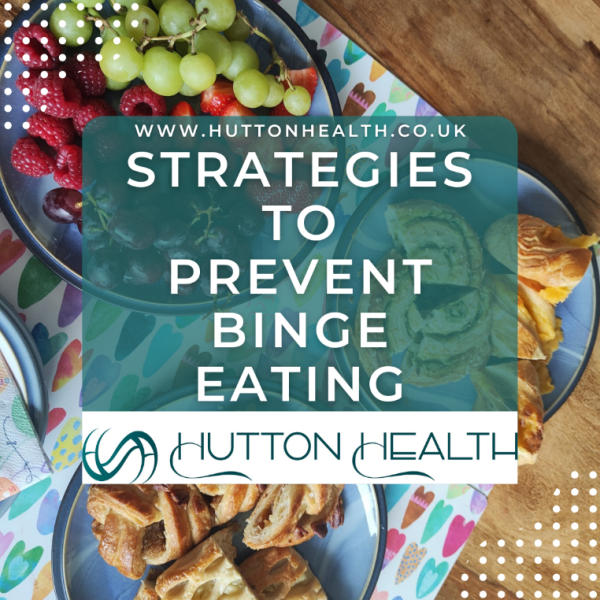Hacks to reduce binge eating
3rd June 2023

(This post may contain referral links. Please read my disclaimer for more info.). As an Amazon Associate I earn from qualifying purchases.
- What is binge eating?
- What are the effects of binge eating?
- Strategies to prevent binge eating
Binge eating happens when you eat more than you intend to and consume more than you would like to.
Almost everyone overeats occasionally. When you look at your general eating pattern, the odd overindulgence won’t have negative consequences on your overall fitness or health.
It is common to feel pressure to eat healthily and to lose weight, chasing an image or dress size that you feel may make you feel happier. This desire to lose weight can make you do things like:
- Restricting eating the things you love
- Believing such thoughts as, ‘sugar is the devil’
- Never allowing yourself to eat processed foods or ‘treat’ food
- Equating certain foods as ‘bad food’
- Forever eating salad and grilled chicken
Understanding what binge eating is and finding strategies to limit binge eating can help make you feel more in control of your food and eating pattern.
1. What is binge eating?
Binge eating involves eating a large amount of food in a short amount of time and feeling out of control in the moment. This eating disturbance happens on a spectrum depending on how frequently the binges take place and how much disturbance a binge causes.

2. What are the effects of binge eating?
If someone feels like they have overconsumed, it can lead to negative emotions, and feelings of shame and guilt. Over time, binge eating can lead to a cycle of overconsumption and restriction, and the resulting weight gain and weight loss.
The effects of binge eating on your health depends on the number of times that binge eating happens and the impairment that the over consumption has on your life.
Long term binge eating can affect your skin, hair and digestive system due to a lack of good nutritional intake.

3. Strategies to prevent binge eating
Eat regularly
If you leave too long between meals, you are more likely to overeat. Eating regularly keeps blood sugar steady and energy levels stable.
Hunger can make cognitive function decline which makes decision making more difficult.
Tips to eat regularly:
-Meal plan. Download Hutton Health's FREE Meal Planner to help set yourself up for long term success.
-Focus on eating 3 balanced meals each day, with healthy snacks between to keep you feeling comfortable and energetic.
-Carry healthy snacks with you.
-Make healthy food easy and accessible.
-Eat a balanced diet and balanced meals rather than many small snacks through the day.
-Focus on a healthy eating pattern.
-Eat healthy food that you enjoy so you don’t feel deprived and feel motivated to eat regularly.
Learn your triggers
Binging and overeating can be a habit that you hide from others. Being aware of when and why you overeat can help you better prepare and avoid the triggers to help reduce the changes of binging.
Dealing with the trigger by creating different, healthier coping mechanisms can help prevent them.
Pay attention to your hunger
Overeating and binging can be caused by emotional eating.
Questions to ask yourself:
-Are you hungry physically?
-Are you hungry psychologically?
-How are you feeling emotionally? Is your hunger attached to an emotion?
Delay eating
If you really are hungry, the hunger will grow over time. If you delay eating for 10 minutes, or after a dopamine distraction, and you still feel hungry, then it is likely that you are truly hungry and a balanced meal or healthy snack is needed.

Emotional eating occurs when food becomes a person’s response to an emotional cue, which may be either internal or external and acts as a short-term cure for negative feelings and emotions.
Emotional eating can often result in overeating or binge eating and can have a direct relation to weight gain, self-esteem and confidence.
Food is often attached to a memory, a time, a place, or an experience. There is power in the comfort that food can provide.
When we attach positive thoughts and feelings to food and use this heal our emotions, making us feel good about our bodies, inside and out, we can make healthy choices in times of emotional upset, helping to break our binge eating patterns.
